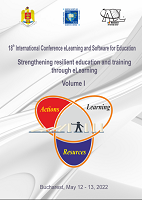ENABLERS OF GAME ACCESSIBILITY
ENABLERS OF GAME ACCESSIBILITY
Author(s): Ioana Andreea Ștefan, Ancuta Florentina Gheorghe, Antoniu Ștefan, Jannicke Baalsrud HaugeSubject(s): ICT Information and Communications Technologies, Inclusive Education / Inclusion, Pedagogy
Published by: Carol I National Defence University Publishing House
Keywords: Games; Authoring Tool; Inclusive education; INCLUDEME;
Summary/Abstract: Research has proven that the use of digital educational and entertainment games in classroom settings represent a suitable way to create effective learning processes, which can engage learners even in subjects that at first sight seem difficult to understand. Games have the capacity, to stimulate learners’ curiosity and improve their knowledge, long-term memory, problem solving skills, cognitive skills and collaboration abilities, preparing them to apply the added-value they have gained into real-world situations. All these benefits remain challenging to achieve, when games are used to teach learners with disabilities. Even if inclusive education has been in focus in the last decades, the creation of accessible resources remains challenging for teachers. Several initiatives, such as the “User Sensitive Inclusive Design”, the “Universal Design”, and the “Design for All” provide a solid foundation for creating inclusive educational tools. However, teachers have limited time to use these ever-evolving frameworks and technologies and more than that, especially for teachers who teach in mixed classes, the effort for preparing meaningful and inclusive activities, adapted to the needs of all the learners, can increase considerable, especially when digital games are used to teach and they are not adapted for learners with disabilities. To address this issue, this paper presents a Game Authoring Tool that implements the INCLUDEME conceptual framework, and that aims to enable teachers to take the role of game designers and create inclusive educational minigames, which can accommodate learners with diverse disabilities such as visual, auditory and cognitive impairments.
Journal: Conference proceedings of »eLearning and Software for Education« (eLSE)
- Issue Year: 18/2022
- Issue No: 01
- Page Range: 152-159
- Page Count: 8
- Language: English

